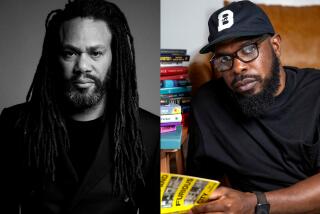Blacklisted Writers Earn Credits at UCLA Screenwriting Graduation
- Share via
Forty-nine years ago this month, the Hollywood Ten--screenwriters who refused to name names before the House Un-American Activities Committee--were sent to prison for contempt of Congress. So began a decade of hysteria that whipped Hollywood into a frenzy, ruining the careers and lives of many.
But on Monday night, the writers and their families wore their blacklisted title like a badge of honor as a younger generation of screenwriters honored them with a lifetime achievement award.
“It’s about time!” joked Bernard Gordon, whose credits include “Battle of the Bulge” and “The Thin Red Line,” at the ceremony held at UCLA’s Freud Hall with hundreds in attendance.
The 1999 UCLA Screenwriters Showcase dedicated their graduation ceremony to legendary writers Dalton Trumbo, Michael Wilson, Adrian and Joan Scott, Norma and Ben Barzman, Edward Huebsch, Jean Rouverol Butler and Hugo Butler, Waldo Salt, Paul Jarrico, Lester Cole, Guy Endore, Alvah Bessie, John Howard Lawson, Robert Lees, Abraham Polonsky, Julian Zimet, Fred Rinaldo, Alfred Levitt, Frank Tarloff, Julian Zimmer and Gordon.
The idea for the dedication was sparked by the controversial lifetime achievement award presented to director Elia Kazan at this year’s Oscar ceremony. Kazan, who testified before the House committee investigating communist influence in Hollywood, was given the award for his body of work, prompting a series of protests from some blacklisted writers, their families and supporters.
On Monday night, there were no protests, only standing ovations.
The list of movies written by the blacklisted writers reads like a pantheon of classic Hollywood films including Wilson’s “Lawrence of Arabia” and “Bridge Over the River Kwai,” Trumbo’s “Spartacus” and “Roman Holiday,” Salt’s “The Philadelphia Story,” Lees’ “Abbott and Costello Meet the Invisible Man,” Lawson’s “Cry the Beloved Country,” Jarrico’s “Tom, Dick and Harry,” Cole’s “Born Free,” Norma Barzman’s “Never Say Goodbye,” and dozens more.
Screenwriter Mike Werb (“The Mask,” “Face/Off”), a UCLA graduate, came up with the idea for honoring the blacklisted writers and their families. “This wasn’t born as a criticism of the academy,” Werb said. “We were going to honor people in comedy like Mel Brooks, but then the blacklist became an issue again and we thought, well, Mel Brooks can wait.”
The gesture visibly moved the writers and their families, many of whom are now documenting their days on the blacklist.
“It’s really so fulfilling, so marvelous,” said Norma Barzman, who is writing a memoir of her 30 years in exile in France. “I’m only sad that my husband [Ben] wasn’t here to enjoy this. It’s so exciting to think that the young people want to do this for us.”
Twenty-three years ago, Oscar-winning writer Wilson dedicated a speech to young writers when he was given a lifetime achievement award by the Writers Guild.
“He told them that something like the blacklist could happen again if this country suffers from a crisis of conscience,” said Becca Wilson, his daughter who is planning to write a screenplay on her father’s experience. “He told them, ‘Protect the mavericks and rebels amidst your ranks.’ ”
One of the evening’s more emotional moments came when Kirk Douglas spoke to the crowd. Douglas became a hero to many when he insisted that Trumbo, who had been writing under assumed names, be given credit for the 1960 film “Spartacus,” directed by Stanley Kubrick and starring Douglas.
When Trumbo’s name blazed across the silver screen, the fires of paranoia that had engulfed Hollywood for so many years began to be extinguished.
“The most precious moment that stands out in my mind is when Dalton Trumbo looked at me and said, ‘Kirk, thanks for giving me back my name,’ ” Douglas said.
For the younger writers, the evening served as a reminder of their history.
“I’ve been thinking so much about that whole period and how so many people had to sacrifice their identity to work,” said Derrick Pete, 28, whose screenplay won one of the top honors Monday night.
His colleague Lisanne Sartor agreed.
“It made me think that we are worrying too much about an industry that is really much kinder now than it was then,” she said. “It put things in perspective.”
And, as Werb told the audience, in these days of federal investigations into violence and movies, writers better take the lessons of the past seriously.
“For those of you who believe that we can finally take the 1st Amendment for granted--we need look no further than today’s headlines,” he said. “. . . This plaque is a symbol of struggle, of courage and integrity. It is a reminder of things that we do not forget and that should never be forgotten.”
More to Read
Only good movies
Get the Indie Focus newsletter, Mark Olsen's weekly guide to the world of cinema.
You may occasionally receive promotional content from the Los Angeles Times.










